Boxing Day Test: Australia take seven wickets in a session to complete famous victory against India
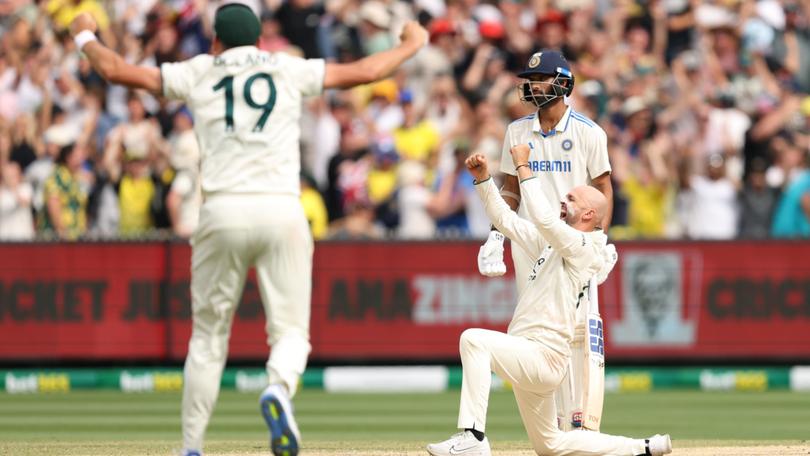
Australia has taken seven wickets in the final session of one of its greatest-ever Tests to defeat India and send their heavyweight series to one final round.
Their door to victory was open, then shut and then locked before their legendary bowling attack kicked it down.
It all happened on a final day played in front of the biggest Test crowd ever seen in this country.
Sign up to The Nightly's newsletters.
Get the first look at the digital newspaper, curated daily stories and breaking headlines delivered to your inbox.
By continuing you agree to our Terms and Privacy Policy.India needed 340 runs to win after Nathan Lyon and Scott Boland batted four overs into day five. They were rolled for 155, with 12 overs left to survive.
The dam wall busted when the brave 84-run stand of Yashasvi Jaiswal ended in a decision review system storm. Jaiswal clearly gloved a bouncer from Pat Cummins to Alex Carey, but sound technology didn’t register a spike.
Fielders crowded around the bat, at leg slip, leg-gully and in a sprawling cordon in the desperate final push for wickets.
For Lyon, more than half of Australia’s fielders had helmets on and some of them could touch the cut track.
The final three wickets fell across three quarters of an hour.
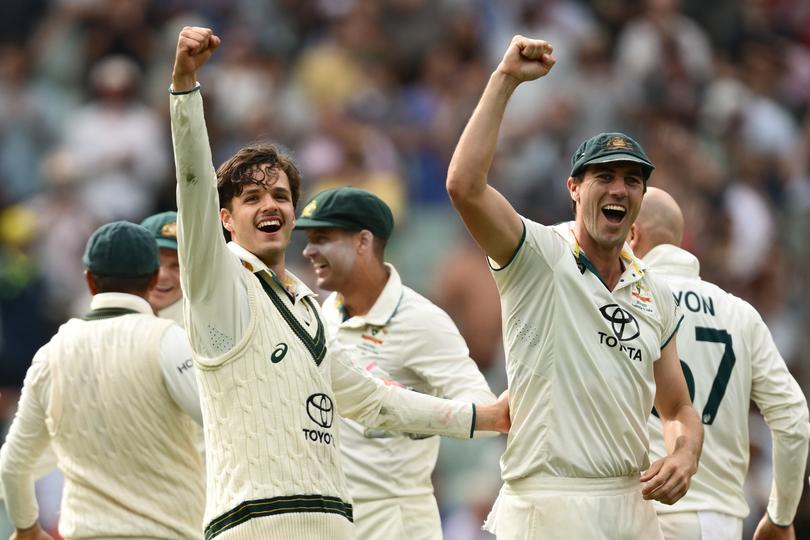
Scott Boland’s symbiotic relationship with the adoring MCG crowd continued when he had Akash Deep caught by Travis Head at short-leg. Two to go.
Then Boland again, with a hard-length ball that hit the splice of Jasprit Bumrah’s bat and scraped into the hands of Steve Smith at slip. One to go.
Then Nathan Lyon found turn on a wicket that had produced little, spinning a ball back onto the bat of Mohammad Siraj. A famous victory sealed.
Australia head to Sydney for the final Test of the epic Border-Gavaskar Trophy showdown with a 2-1 lead in the series.
It is the first time Australia has won two matches against India in a decade. Given they are the holders, a draw in Melbourne would have left India in the box-seat to retain the trophy for the fifth consecutive time.
And the pulsating Test broke a near century-old record for the biggest crowd ever at a Test match in Australia, passing a Bradman-era Ashes clash at the famous ground in 1937.
Australian captain Pat Cummins declared it the best Test match he has ever played and said the victory ranks “right at the top” of Test wins in his career, alongside the first Test of last year’s Ashes where he hit the winning runs at Edgbaston.
“It was probably the best Test match I’ve been involved in, in terms of 80-odd thousand across the first few days — I don’t know what the crowd was today but it was huge — I felt like it swinged a lot as well,” he said.
“You never felt like you were so far ahead of the game that a win was certain.
“Overall it was just one of those great wins.
“We love playing at home, we love playing Test matches and this was one of the bigger ones you are going to play in and everyone was up for it.”
The visitors crumbled from 3-112 at tea to be all out in two hours. They lost three wickets in the blink of an after the break.
Cricket’s shape-shifter Rishabh Pant gave a glimpse into their tactics when he tried to launch a Travis Head ball into Richmond and was caught by a tumbling Mitch Marsh at long-on.
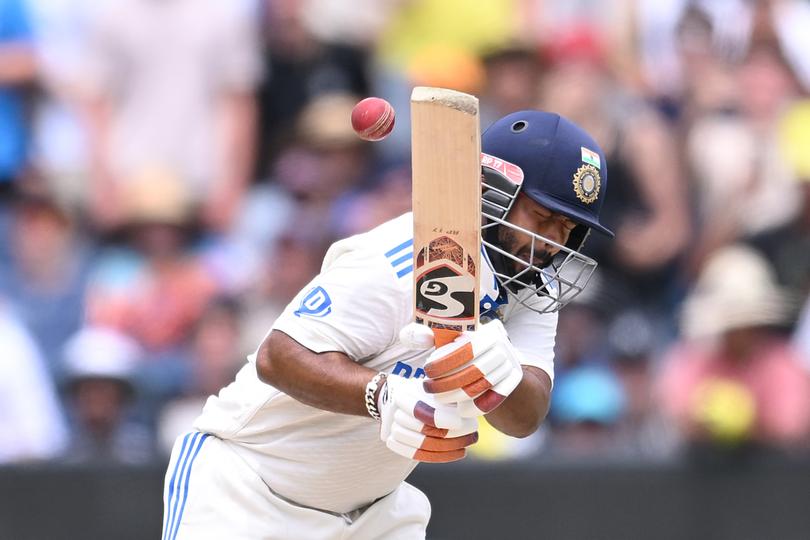
Let down by their top order and embattled champions Rohit Sharma and Virat Kohli, boy wonder Yashasvi Jaiswal and Pant were forced to steady. The run-rate climbed from less than two to more than four early in Pant’s innings and while the dynamo flirted with match-winning mode, he never flicked the switch.
He wore a ball from Cummins on the bicep and then wore Australia down with ducks and dead-bats and that led to a farcical over before tea where Marnus Labuschagne bowled a series of bouncers and Pant dodged all of them.
It made his dismissal a bizarre moment that left an elongated lower order to fend for themselves, four years after he had batted with the tail at the Gabba to spearhead their most famous victory on these shores.
The dismissal of Jaiswal was the second DRS flashpoint of his innings. On 31 he was given not-out by umpire Joel Wilson and survived a review only by umpire’s call.
He fumed as he walked off the ground after the controversial caught-behind call and India’s hopes went with him.
“Snicko hasn’t proven it to be correct, but the umpire picked up the deflection and froze it where the ball was on the end of the glove. As far as I’m concerned, there is no argument whatsoever,” former Australian captain Ricky Ponting told Channel 7.
Sharma’s career is now in the hands of selectors, with Indian’s standing captain failing to pass 10 in his three Tests this series after also battling in their home whitewash against New Zealand.
The 37-year-old looked far more promising early in his innings, playing balls from Cummins and Starc with the new ball much later and behind is front pad, but Australia had turned to tempting him into the pull shot, which is how he fell on day two.
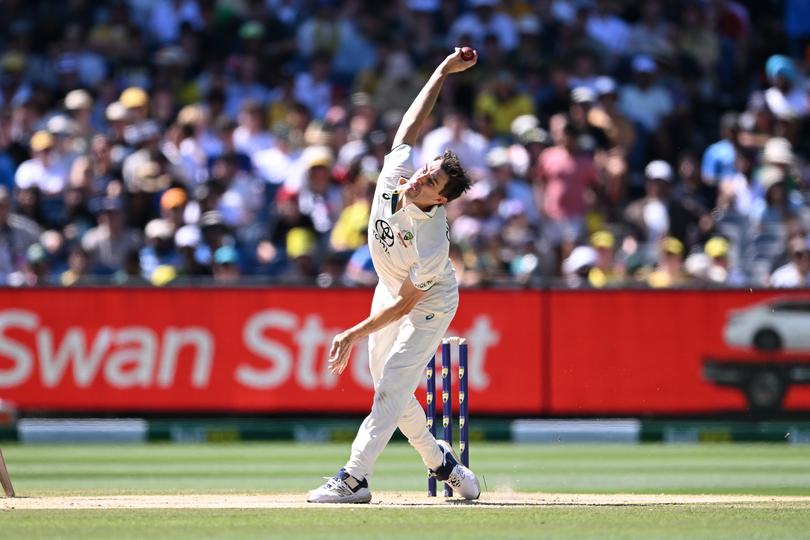
With mid-wicket vacant, Sharma tried to turn a fourth-stump ball from Cummins into the leg side and edged into the cordon for nine.
Cummins had KL Rahul — India’s best specialist batter in the series — out moments later for a duck, popping the balloon the tourists had just starting inflating.
Mitchell Starc took the key wicket of Kohli for just five on the stroke of lunch to put Australia in the driver’s seat.
Rahul couldn’t have done much more to keep out a ball that darted off the pitch back in towards his outside edge.
He would have played well inside it if the ball hadn’t deviated quite so much.
But the same can’t be said for Kohli, who lost patience for the second time in the match and flashed at a wide ball to be caught in the cordon.
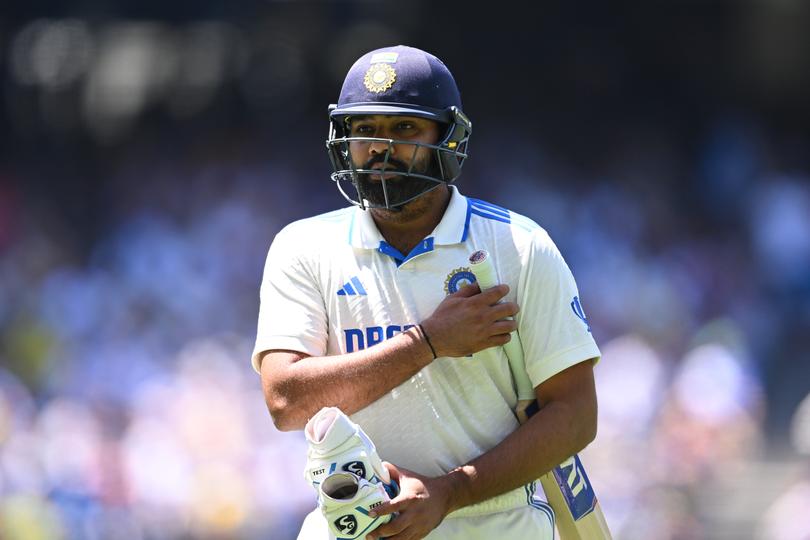
The Australian captain said their morning burst was close to “perfection from a bowling point-of-view” and took the win out of the equation for India, which helped open the door for them later in the day.
Cummins explained the decision to bat into the fifth day and said they didn’t feel as if they had enough runs on Sunday night on a flat wicket.
“I thought the wicket was pretty good, you saw our tail bat reasonably comfortably on it, so I felt like we needed at least 300,” he said.
“You saw today it didn’t spin heaps, it didn’t play many tricks, so we thought there was still enough time.”
Boland finished with 3-39 from 16 overs. It won’t be his finest MCG moment, but it is not much less remarkable than his Ashes heroics, bowling Australia to victory after starting the series outside the team again.
West Australian Mitch Marsh was tossed the ball early, after just 19 overs, but bowled just three overs and took 0-2 as he gets set to sweat on a call by selectors over his future this week.
There are also lingering question marks over Mitchell Starc, who spent part of the final session off the ground and receiving treatment from trainers. His place in the side for the Sydney Test is under a cloud after he bowled through a rib issue, with just three days between matches.
